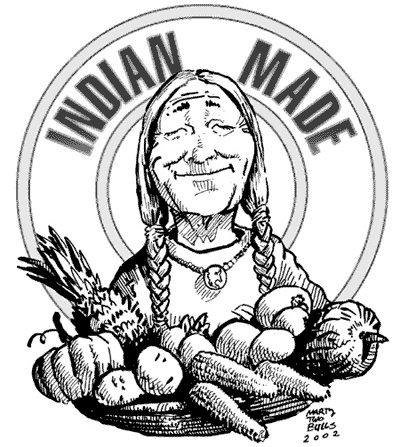By Ruth Hopkins
I would later discover that Natives aren’t the only ones who fail to grasp the significance of our Indigenous ancestors in the history of the land that would later be called the United States of America. Those very textbooks are proof. In public schools, any mention of Natives is likely relegated to a few paragraphs about Thanksgiving, Pocahontas or Sacajawea. You might hear about The Battle of Little Big Horn in passing, but only as “Custer’s Last Stand.”
Natives aren’t given a lot of exposure in mainstream culture either. You’ll rarely, if ever, see a Native character on television or in the mainstream media. While we’ve made strides in representing ourselves positively on a national platform, we’ve got a ways to go to achieve accuracy in the depiction of us as a People. This is evidenced by false imagery that’s saturated pop culture, ala scantily clad white women in headdresses and war paint, and the tolerance of negative stereotypical mascots like the Cleveland Indians and the Washington Redskins.
In reality, Natives have played a pivotal role in American history and will continue to do so. There’s no doubt that European immigrants would not have survived long enough to form the 13 colonies but for the assistance of Natives on the east coast. Besides providing the first handouts to the starving and diseased European aliens who landed, Natives taught them how to fish, hunt, and plant foods in North America, how to build watercraft, and maneuver along Native trails.
Today, around half of the globe’s food supply comes from crops like corn and potatoes--which were originally cultivated by Natives. Cotton, a key fabric source, was also first grown by Natives. Medicines derived from Native plants were used by Natives in the Americas long before the arrival of Europeans.
That’s just the tip of the iceberg. Most Americans are completely clueless to the fact that the U.S. Constitution has a Native foundation. Ben Franklin, one America’s ‘founding fathers,’ modeled much of the Constitution after the Iroquois Confederacy. Even today, the way the congressional House of Representatives works with the Senate is rooted in how the Iroquois Confederacy was run.
Natives affected the revolutionary social concepts of early Americans too. Europeans who immigrated here came from countries that were monarchies. Their countries of origin were very socially stratified, with castes. In other words, if someone were born into poverty, they were likely doomed to remain such for life. For such a person, the option of earning an education or pursuing a gainful means of employment was extremely remote. Natives and their vast lands introduced Europeans to the concept of individual dignity and a person’s right to be free. For example, if a Native man didn’t wish to hunt or fight in battle, he wasn’t forced to do so. There were also Native women who became warriors and who held leadership positions within their Tribe. The concept of individual freedom, in the European mind, became one’s right to “life, liberty, and the pursuit of happiness.” Mixed with capitalistic greed, such liberty gave birth to the phenomena once known as ‘The American Dream.”


No comments:
Post a Comment
Note: Only a member of this blog may post a comment.